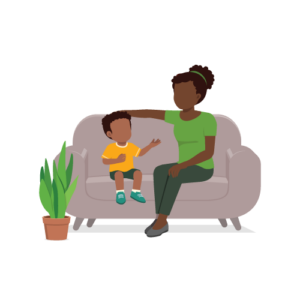 Anger and frustration are normal and everyone gets cross from time-to-time. It’s normal for children and young people to struggle with these feelings.
Anger and frustration are normal and everyone gets cross from time-to-time. It’s normal for children and young people to struggle with these feelings.
Anger becomes a problem when it makes your child unhappy or starts to affect their relationships or is expressed through destructive behaviour towards themselves or others.
What are the signs of anger?
Children may display signs of anger differently depending on their age. Your child might not tell you they’re angry but might:
- be aggressive to others or themselves, self-harming or being critical
- ignore or withdrawing from people
- shout, get aggressive or have arguments with parents, siblings, peers, teachers
- seem tense and unable to relax
- shake, tremble or cry
- feel hot, with a racing heart or chest pain, stomach aches, headaches, fast breathing, clenched muscles or fists.
Anger triggers
Being aware of possible triggers, and of how your child reacts when they are angry, can help you recognise those triggers and learn some coping strategies.
- It may be something that’s happened recently, or something built up over time.
- It can be caused by uncertainty or things they don’t feel able to control.
- It could come from something specific, like falling out with friends, stress at school from exams or bullying, or feeling hungry or tired.
- Sometimes your child won’t know what has made them angry. It might be feeling like they’re not being listened to, or not feeling good enough.
How to help your child
You could do something creative, give the feelings a name, draw a picture of them or keep a mood journal so you child understands the triggers and how they feel when it’s happening.
- Underneath their anger, your child might be feeling other emotions like fear, worry or sadness and talking about how they feel can help them manage better and be less likely to act out in anger. Try to understand. It may be a small issue to you, but to them it could be huge.
- Help your child spot the signs they are getting angry and explore what is triggering them.
- Help your child find stories where a character learns to manage their anger. Ask your school or library for recommendations and ones you can borrow for free.
- Help them find safe ways to let out their anger. Find them a quiet space they can always go to when they need time alone or teach them how to do some grounding or breathing
- Use distractions. Younger children might find colouring and drawing useful, older ones may could listen to music, talk to a friend, watch TV or play an instrument.
- Look after yourself too. This will help you cope with and react better to situations as they come up.
Families who might need further support
Some children and young people need further support to help them learn how to manage their feelings.
Kent School Health offers one-to-one support based on your child’s unique needs. Visit our special educational needs or neurodivergence page for more information on the support available for you and your child.
Useful resources
- NHS.uk and Young Minds have some great tips around helping your child with anger issues.
- Young Minds has a free helpline and webchat service available to parents.
- Visit Every Mind Matters for more support looking after your own mental health as a parent.
- Families in Kent and Medway can access free online courses. ‘Understanding your child’ courses are here to you develop as a parent as your family grows. These free online courses are available in 15-20-minute chunks, perfect for busy parents and carers. Use the access code Invicta to register for your free account. perfect for busy parents and carers.
- Contact the Kent School Health Service - we really want to hear from you if you feel you need more support for you and your child.